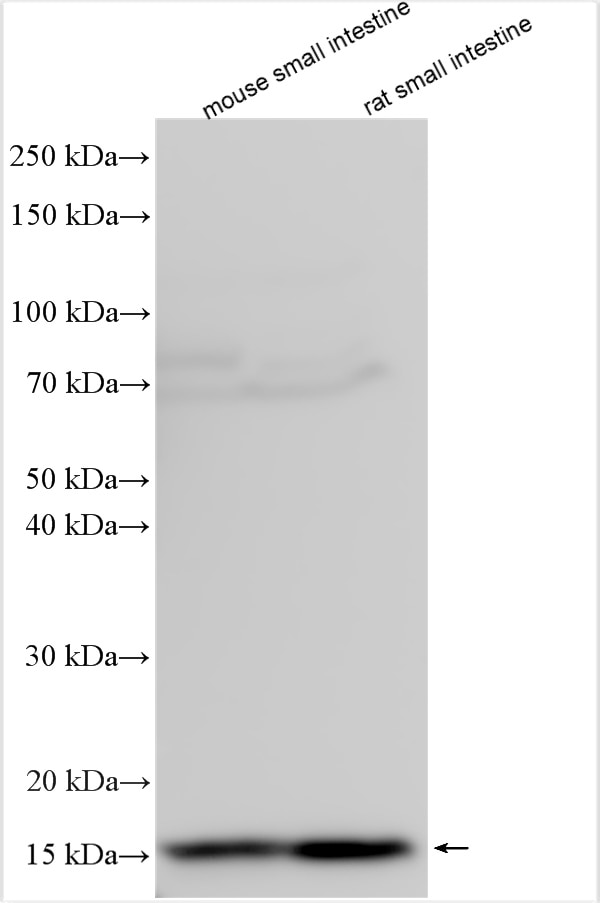Tested Applications
| Positive WB detected in | mouse small intestine tissue, rat small intestine tisue |
Recommended dilution
| Application | Dilution |
|---|---|
| Western Blot (WB) | WB : 1:1000-1:4000 |
| It is recommended that this reagent should be titrated in each testing system to obtain optimal results. | |
| Sample-dependent, Check data in validation data gallery. | |
Product Information
13610-1-AP targets REG3A in WB, ELISA applications and shows reactivity with human, mouse, rat samples.
| Tested Reactivity | human, mouse, rat |
| Host / Isotype | Rabbit / IgG |
| Class | Polyclonal |
| Type | Antibody |
| Immunogen |
CatNo: Ag4508 Product name: Recombinant human REG3A protein Source: e coli.-derived, PGEX-4T Tag: GST Domain: 1-175 aa of BC036776 Sequence: MLPPMALPSVSWMLLSCLMLLSQVQGEEPQRELPSARIRCPKGSKAYGSHCYALFLSPKSWTDADLACQKRPSGNLVSVLSGAEGSFVSSLVKSIGNSYSYVWIGLHDPTQGTEPNGEGWEWSSSDVMNYFAWERNPSTISSPGHCASLSRSTAFLRWKDYNCNVRLPYVCKFTD Predict reactive species |
| Full Name | regenerating islet-derived 3 alpha |
| Calculated Molecular Weight | 175 aa, 19 kDa |
| Observed Molecular Weight | 16 kDa |
| GenBank Accession Number | BC036776 |
| Gene Symbol | REG3A |
| Gene ID (NCBI) | 5068 |
| RRID | AB_3669166 |
| Conjugate | Unconjugated |
| Form | Liquid |
| Purification Method | Antigen affinity purification |
| UNIPROT ID | Q06141 |
| Storage Buffer | PBS with 0.02% sodium azide and 50% glycerol, pH 7.3. |
| Storage Conditions | Store at -20°C. Stable for one year after shipment. Aliquoting is unnecessary for -20oC storage. 20ul sizes contain 0.1% BSA. |
Background Information
Regenerating family member 3 alpha (Reg3A) encodes a pancreatic secretory protein that may be involved in cell proliferation or differentiation. During pancreatic inflammation, the secretion of Reg3A by inflamed acinar cells is sensitively and markedly upregulated. The mature protein also functions as an antimicrobial protein with antibacterial activity.
Protocols
| Product Specific Protocols | |
|---|---|
| WB protocol for REG3A antibody 13610-1-AP | Download protocol |
| Standard Protocols | |
|---|---|
| Click here to view our Standard Protocols |




